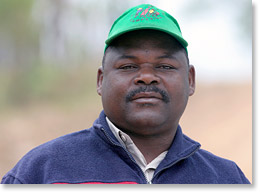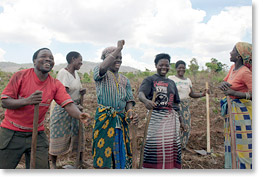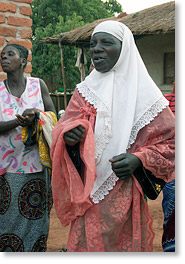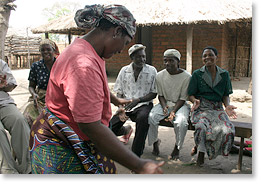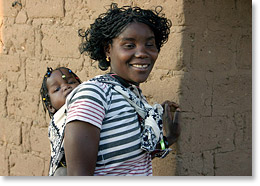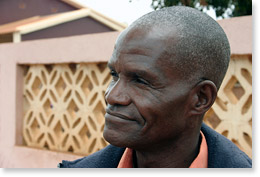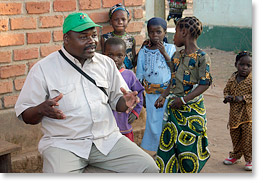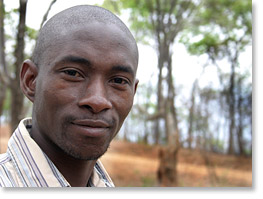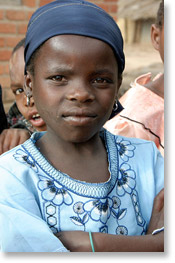|
Interview with Julio dos Santos Pessego
of UNAC and UCASN An Understanding of Associations Lichinga, Niassa, Mozambique |
||||||||||||||||||||||||||||||||||||||||||||
In Motion Magazine: Do you come from a farming family yourself? Julio dos Santos Pessego: Yes, I am a member of a peasant family. My father and mother are peasants, and I also am a peasant. In Motion Magazine: Where did you grow up? Julio dos Santos Pessego: I grew up in a community called Satique in the Ribaue district of Nampula province. I attended an agricultural college. In Motion Magazine: What crops did you grow on the family farm? Julio dos Santos Pessego: We grew crops such as maize, beans, sorghum, cassava -- basically these crops. In Motion Magazine: Why did you decide to start working with UNAC? Julio dos Santos Pessego: First of all, I was feeling isolated. There was an association in my community and I wanted to be in an association because the association received goats and training. I thought it would be good to be part of the association. Also, I wanted to clearly understand government policies and in the association you can receive training about government agriculture policies. I wanted to receive this training so it was one of my motivations to be a part of an association. An understanding of associations Julio dos Santos Pessego: The situation for peasants in Niassa is improving because it is not like before, years ago, because now the peasants understand the issues of associations. But, on the other hand, it is necessary to develop efforts to reach all communities. Some communities understand the concept of associations and are working on the issues of associations, but other communities know nothing about them. They have no associations in those communities. It will be good to develop our efforts to strengthen the understanding of associations in all communities. In Motion Magazine: How many associations are there in Niassa? Julio dos Santos Pessego: To talk about the real number can be difficult, but to date 410 are registered. These associations have registered with the government, but there are a lot of other associations which are not registered. In Motion Magazine: Are they all organized under UNAC? Julio dos Santos Pessego: They are not all organized by UNAC but they are all affiliated with UNAC. In Motion Magazine: What is an association? Julio dos Santos Pessego: In a few words, a group of people who come together to try to solve a certain problem or to achieve certain objectives -- for example, water, agriculture, training, or business. People come together to try to solve these kind of problems. In Motion Magazine: And how to do they that? Julio dos Santos Pessego: With self initiative, people come together and try to find training. To proceed they need self-analysis to understand the area where they are living, and what are the main problems that they would like to overcome. They normally identify one problem. For example, if they identify that the community problem is commercialization of their agricultural products, they try to do a study to see how to overcome the situation. In Motion Magazine: How does this relate to food sovereignty? Julio dos Santos Pessego: Before, people didn’t understand this saying, food sovereignty. But now people are trying to diversify crops to respond to food sovereignty. Cultivating only one crop cannot fulfill or respond to food sovereignty. With one crop there is no food security. But when we have different crops the peasant can choose what they would like to eat or to produce. In Motion Magazine: In the period 1975 to 1985, there were large plantations with only one crop? Was that a good thing or was that problem? Julio dos Santos Pessego: It was a problem because normally they had only one crop, which was maize. They had problems because the maize was a food crop but it did not bring a lot of revenue. The project failed because having only maize was not enough to cover people’s needs. In Motion Magazine: How did people solve this problem? Julio dos Santos Pessego: Well, first, these kinds of farms disappeared. But, we think that one of the ways to solve this problem is to give these farms to small associations. (Although,) We believe also that the small associations don’t have the capacity to cover all the area of these farms because they are very big. In Motion Magazine: How did they disappear? Julio dos Santos Pessego: It was because of the war. After independence, during the war among Mozambicans, with RENAMO (Resistência Nacional Moçambicana), there was no time to farm because the enemy, RENAMO, was destroying farms and tractors. This ended the farms. In Motion Magazine:And that happened here in Niassa? Julio dos Santos Pessego: It happened here in Niassa, in Zambezia, also Manica where there were very big production enterprises. During that time I was working in one of the big production enterprises in Zambezia and a major part of the workers of the enterprise were stopped from working in agriculture so that they could become soldiers to fight with the enemy. The enterprise had only a small amount of workers. Of the number of workers, seventy percent became soldiers to defend the enterprise. The number of workers remaining to work in agriculture was very reduced. In Motion Magazine: You said at the beginning that the situation with the associations has improved. How has it improved? Julio dos Santos Pessego: The improvement I was talking about is not economic improvement but there is quite a bit of improvement, in terms of policies and awareness. The associations, now they know how to develop small projects, how to manage things when they receive money for some small project. They know how to manage and they know the objective of being a member of an association. They know the objective of an association. For instance, in talking about this improvement, it is possible to say that the associations, which are constituted of peasants, these peasants will elect a coordinator -- the peasants have the capacity to manage projects. It is not necessary to contract outside people to assist because it is possible to select people from within the association to be a coordinator, a president, to be on a directors board, to hold other positions. We feel that the associations are improving because although they need some economic, financial improvement to develop their activities, we believe that the associations In, UNAC, UCA and UCASNE, the methodology or strategy is to select members of the associations to be leaders of the projects and not to bring in advisors. In Motion Magazine: Do you think the associations are going to be able to improve their economic situation? Julio dos Santos Pessego: We believe that it will improve but it is a slow process. In Motion Magazine: Are you worried about the Green Revolution coming in to this area? Julio dos Santos Pessego: It is a big worry. We are worried because the issues of the Green Revolution include simply copying what another country is doing. For example, if you are taking a test and you copy what someone is doing and you put that in your paper but you don’t know why they wrote that answer. I use this example because we see that this will not help the situation of Mozambican peasants. First of all, for Mozambican peasants to be a part of the Green Revolution it is necessary to satisfy a lot of conditions. As peasants, we understand that this is another kind of colonization in this country. We believe that this is a government policy to achieve some objective of their donors, perhaps the World Bank, or other donors. In Motion Magazine: What would happen if the Green Revolution came here? Julio dos Santos Pessego: What I think will happen if the Green Revolution goes ahead here, is the small peasant will disappear. It can change the kind of crops, food that peasants are producing now. The Green Revolution can bring other kinds of seeds, improved seeds, genetically-modified seeds. The crops of the peasants can also disappear. In Motion Magazine: How would the peasants disappear? Julio dos Santos Pessego: For example, here in Niassa, we have forest enterprises which are taking peasant lands. They come and they take a lot of land which includes peasant lands - and the peasants have to leave. These peasants, which have to leave, they don’t know where to go and they end up working in the forest enterprise. Normally, they receive a very small salary that is not adequate for their lives. But they have no choice as they have no other way to survive. In Motion Magazine: But if all the land belongs to the people, how can these companies take the land? Julio dos Santos Pessego: We are not saying that they can (legally) take the land, they just take it. In Motion Magazine: The government doesn’t say, “No, you can’t do this”? Julio dos Santos Pessego: The assembly says the land belongs to the people, but when a company comes to ask for land the government accompanies the enterprise to the community and gives away the land without following the necessary steps to identify that land to give it to the enterprise. The government has decided that the land belongs to the people. People who need to cultivate, can cultivate freely. But when some enterprise wants to create a plantation it is the same government which accompanies that enterprise to the community and gives them the same land which was reserved for the community. On the same road as La Via Campesina In Motion Magazine: Is there anything else you’d like to say? Julio dos Santos Pessego: Yes. We as peasants are committed to trying to have a better life, as do peasants in other countries. We are committed to helping other peasants advocate for their rights and understand government policies to be able to discuss with the government about their rights. It is very important to know about laws because if you don’t know them, you will not be able to know when you are committing a mistake, when you are not committing a mistake, or whether someone can come and punish you without cause. You cannot make a claim about something if you don’t know if it is right or wrong. As peasants, we will try to continue to be connected with peasants of other countries to try to overcome the current situation. In Mozambique, it is common to hear that agriculture is the base of development, but the ones in the field doing the cultivating are the last ones being considered. In Motion Magazine: What do you think of La Via Campesina? Julio dos Santos Pessego: We are on the same road as Via Campesina. Because of this we are committed to spreading information about the laws, emphasizing agricultural laws so that all peasants have access to this information; to know how to defend themselves, to know how to claim peasant rights; what the law says about peasant rights. To know about these rights and to protest when they are not being fulfilled. In other countries, the big problem is land, peasants do not have land to cultivate, but in Mozambique the situation is different. We have the land but the big problem is the peasants’ conditions. Sometimes peasants don’t have water to drink, they don’t have a school to study in, they don’t have a hospital to access health assistance. The schools here are very expensive. Sometimes, as a peasant, we are not able to support our children to get to secondary school. These are big problems for peasants in Mozambique. |
||||||||||||||||||||||||||||||||||||||||||||
| Published in In Motion Magazine January 16, 2009 | ||||||||||||||||||||||||||||||||||||||||||||
|
Also see:
|
||||||||||||||||||||||||||||||||||||||||||||
If you have any thoughts on this or would like to contribute to an ongoing discussion in the  What is New? || Affirmative Action || Art Changes || Autonomy: Chiapas - California || Community Images || Education Rights || E-mail, Opinions and Discussion || En español || Essays from Ireland || Global Eyes || Healthcare || Human Rights/Civil Rights || Piri Thomas || Photo of the Week || QA: Interviews || Region || Rural America || Search || Donate || To be notified of new articles || Survey || In Motion Magazine's Store || In Motion Magazine Staff || In Unity Book of Photos || Links Around The World NPC Productions Copyright © 1995-2018 NPC Productions as a compilation. All Rights Reserved. |


